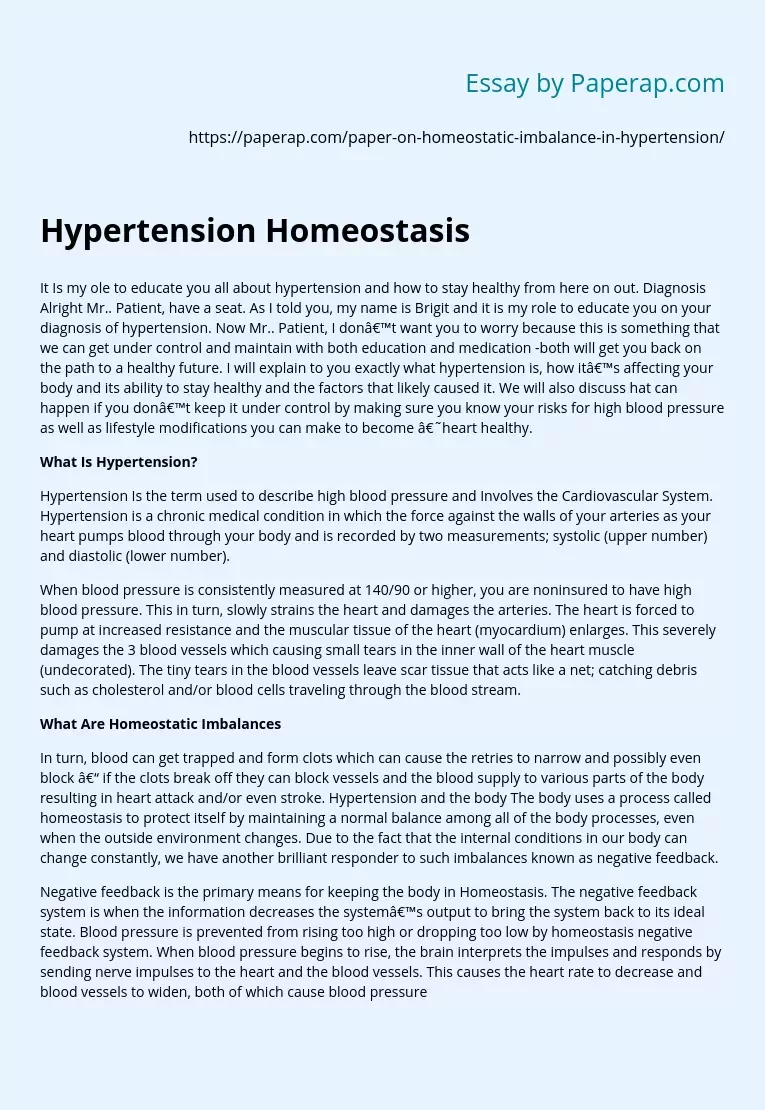Hypertension Homeostasis
It Is my ole to educate you all about hypertension and how to stay healthy from here on out. Diagnosis Alright Mr.. Patient, have a seat. As I told you, my name is Brigit and it is my role to educate you on your diagnosis of hypertension. Now Mr.. Patient, I don’t want you to worry because this is something that we can get under control and maintain with both education and medication -both will get you back on the path to a healthy future.
I will explain to you exactly what hypertension is, how it’s affecting your body and its ability to stay healthy and the factors that likely caused it. We will also discuss hat can happen if you don’t keep it under control by making sure you know your risks for high blood pressure as well as lifestyle modifications you can make to become ‘heart healthy.
What Is Hypertension?
Hypertension Is the term used to describe high blood pressure and Involves the Cardiovascular System.
Hypertension is a chronic medical condition in which the force against the walls of your arteries as your heart pumps blood through your body and is recorded by two measurements; systolic (upper number) and diastolic (lower number).
When blood pressure is consistently measured at 140/90 or higher, you are noninsured to have high blood pressure. This in turn, slowly strains the heart and damages the arteries. The heart is forced to pump at increased resistance and the muscular tissue of the heart (myocardium) enlarges.
This severely damages the 3 blood vessels which causing small tears in the inner wall of the heart muscle (undecorated). The tiny tears in the blood vessels leave scar tissue that acts like a net; catching debris such as cholesterol and/or blood cells traveling through the blood stream.
What Are Homeostatic Imbalances
In turn, blood can get trapped and form clots which can cause the retries to narrow and possibly even block – if the clots break off they can block vessels and the blood supply to various parts of the body resulting in heart attack and/or even stroke. Hypertension and the body The body uses a process called homeostasis to protect itself by maintaining a normal balance among all of the body processes, even when the outside environment changes. Due to the fact that the internal conditions in our body can change constantly, we have another brilliant responder to such imbalances known as negative feedback.
Negative feedback is the primary means for keeping the body in Homeostasis. The negative feedback system is when the information decreases the system’s output to bring the system back to its ideal state. Blood pressure is prevented from rising too high or dropping too low by homeostasis negative feedback system. When blood pressure begins to rise, the brain interprets the impulses and responds by sending nerve impulses to the heart and the blood vessels. This causes the heart rate to decrease and blood vessels to widen, both of which cause blood pressure to decrease.
When one or more components of the body lose its ability to nutrient to homeostasis, if moderate enough, will cause a disease or disorder – hypertension in this case. Factors that can cause a homeostasis imbalance include, but are not limited to: stress, alcohol, loss of sleep, lack of oxygen, and over/under eating. Many people have high blood pressure for years without knowing it. Most of the time, there are no symptoms, but when high blood pressure goes untreated can abet arteriosclerosis – hardening of the arteries – all over the body from the brain, kidneys, eyes, heart, 4 and legs, and can lead to kidney failure, heart attack, stroke, blindness and even problem that can affect all the organs of the body.
Conclusion
Now that Eve educated you about hypertension Mr.. Patient, I want you to know that we can get things back under control quite easily with an adjustment in lifestyle and medication. A few of the main ways you can keep your blood pressure under control include: a salt-reduced diet, maintain a healthy weight, daily exercise, limit coffee and alcohol consumption, smoking cessation (if applicable) and stress management. You will also be receiving various blood pressure medications including diuretics which ill help the body get rid of excess sodium and water, beta-blockers which reduce the heart rate, ACE inhibitors which help the blood vessels relax and open up and possible other medications that will aide in the lowering of your high blood pressure.
Hypertension Homeostasis. (2019, Dec 05). Retrieved from https://paperap.com/paper-on-homeostatic-imbalance-in-hypertension/

